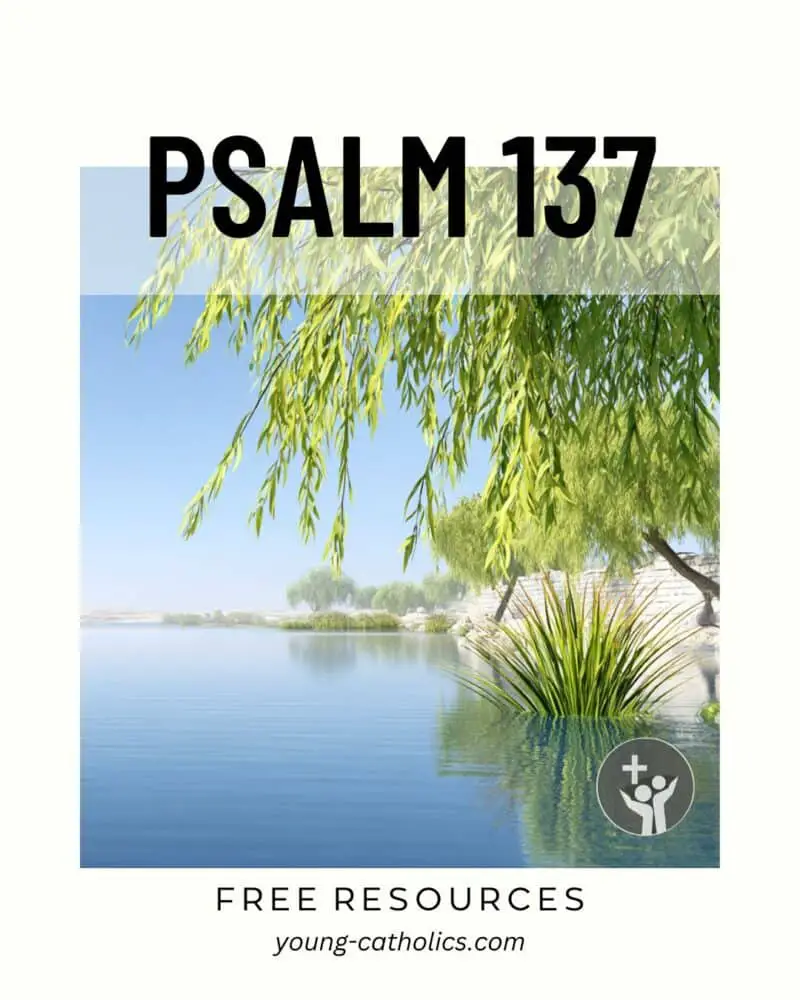Psalm 137

Psalm 137 is one of the most emotional psalms in the Bible. It speaks of exile and longing for home. The people of Israel had been taken far from Jerusalem. They sat by the rivers of Babylon and wept as they remembered their city and the temple of God. This psalm gives us a picture of sorrow and loss.
The psalm shows how deeply the people loved their homeland and their faith. They could not sing their songs of worship in a strange land. Their joy was gone, and their music had turned to silence. Yet in their sadness, they held on to the memory of Jerusalem. It was always in their hearts.
This psalm also speaks of anger and the desire for justice. The people had suffered greatly. They wanted God to remember what had been done to them. These words may seem harsh, but they show real human pain. The psalm does not hide from that pain.
For us as Catholics, Psalm 137 reminds us of the longing we all feel for God and for peace. It also shows us how important it is to remain faithful, even in times of hardship. The psalm is honest about grief, but it also points to hope that God sees and remembers His people.
Tears by the Rivers
This psalm comes from Book Five of the Psalms, which gathers songs and prayers written at different times in Israel’s history. Psalm 137 was written during the exile in Babylon, after Jerusalem had been destroyed in 587 BC. The people were taken far from their land and forced to live under a foreign power. This time of exile was one of the darkest moments for Israel.
The psalm does not have a named author. Many psalms are linked to David, but this one clearly belongs to the later time of exile. It speaks with the voice of the community, sharing their pain and longing for Jerusalem. The words are not just personal. They show the sorrow of a whole people who had lost their home and their freedom.
This psalm is often remembered for its raw honesty. It does not hide the anger and grief of the people. They missed their land, their temple, and their way of worship. The psalm captures their struggle to keep faith in a foreign place.
Knowing this history helps us understand the deep meaning of the psalm. It is not just a song of sadness. It is a prayer from people who held on to God while they sat in exile. It reminds us that God’s people have carried their faith through suffering and loss before, and they never forgot who they were.
Longing for Home and Justice
One theme in this psalm is the longing for home. The people in exile could not forget Jerusalem. For Catholics, this reminds us of our deeper longing for God and for heaven. Just as the exiles sat by the rivers of Babylon and wept, we sometimes feel far from God. Yet the memory of His love and His promises stays with us.
Another theme is the importance of worship. The exiles could not sing their sacred songs in a foreign land. For us, this points to the gift of the Mass and the sacraments. They are part of our true home with God. Even when we feel lost, worship helps us remember who we are as His people.
The psalm also speaks about justice. The people call on God to remember what had been done to them. These words sound harsh, but they show a deep trust that God is the one who will make things right. For Catholics, this reminds us that God is just and that He will bring peace in the end.
Finally, this psalm shows the power of memory. The exiles promised never to forget Jerusalem. In the same way, Catholics are called to remember Christ’s sacrifice and to live with hope. Even in sorrow, we look forward to the time when God will gather His people together again.
Finding Hope in Exile
Psalm 137 still speaks to us today. Many people know what it feels like to be far from home or to lose something dear. The sadness of the exiles by the rivers of Babylon mirrors the struggles of people who suffer from war, poverty, or broken families. Their cry connects with anyone who feels lost or forgotten.
For Catholics, this psalm reminds us that our true home is with God. Life can feel like exile when we face hardship, but we hold on to the hope of heaven. Just as the people of Israel longed for Jerusalem, we long for the fullness of God’s kingdom. This longing keeps us faithful even when life is difficult.
The psalm also teaches us about prayer in times of pain. It shows that we can bring our sadness, anger, and even our questions to God. We do not need to hide our feelings. God listens, even when our words are filled with struggle.
In our world today, where so many face suffering, this psalm calls us to stand with those in need. It also calls us to trust that God sees every exile, every tear, and every loss. And just as He restored His people in the past, He will bring healing and peace in His time.
A Prayer Based on Psalm 137
When We Feel Far Away
Lord, sometimes we feel far from home.
We feel out of place, unsure, and alone.
Like your people by the rivers of Babylon,
we long for peace and for your presence.
Help us remember who we are.
When the world pulls us in many directions,
keep your truth strong in our hearts.
Do not let us forget your love.
We bring you our anger and our sadness.
You know our struggles and our pain.
Teach us to trust you with everything we feel.
Be near when life feels broken.
Lord, guide us back to you.
Be our home when we wander.
Fill us with hope as we wait for your kingdom.
Keep us faithful until we see you face to face.
Prayed in the Church
In the Roman Catholic lectionary, Psalm 137 is prayed as part of the liturgy. It is used in both weekday and Sunday readings. When it is chosen, it connects with other passages that speak about exile, sorrow, or trust in God’s care. The psalm gives words to the Church for times when life feels broken or uncertain.
The refrain often focuses on remembering Jerusalem. This helps the faithful connect the memory of the holy city with our longing for God’s kingdom. It ties the ancient story of Israel to our own journey of faith today.
Hearing this psalm in Mass reminds us that our sadness and struggles have a place in prayer. It shows that the Church does not only sing songs of joy. We also bring our tears and pain before the Lord.
In the lectionary, Psalm 137 helps the people of God stay honest in prayer. It teaches that even sorrow can become worship when we give it to God. It is a reminder that the story of Israel is also our story, and their longing for home reflects our own longing for God.
Resources
Social Media Graphics and Bulletin Artwork
By the Rivers We Wept

This image, inspired by Psalm 137, captures the sorrow and longing of God’s people as they sat by the rivers of Babylon. It is a moving reminder of faith in exile and hope for return. Perfect for bulletins, newsletters, or youth ministry resources, it can help spark reflection and prayer.
Download this image today to use in your parish or ministry and share the timeless message of trust in God, even in times of loss.
Paid subscribers may download a large copy this digital artwork without watermarks, suitable for use in bulletins, social media, newsletters, etc., free of charge by clicking here. You must be logged in as a paid subscriber to access the file.
Only current paid subscribers have the rights to use the artwork.
Questions and Answers about Psalm 137
What is Psalm 137 about?
Psalm 137 is about the people of Israel living in exile in Babylon. They remembered Jerusalem with sadness and longed to return. It is a song of sorrow, memory, and hope.
Why were the Israelites in Babylon?
They were taken there after Jerusalem was destroyed in 587 BC. The Babylonians conquered the city and forced many people to leave their homeland.
Why does the psalm mention not singing?
The exiles did not want to sing songs of the Lord in a foreign land. For them, music belonged to the worship of God in Jerusalem. Singing in Babylon felt wrong and painful.
Why does the psalm sound angry at the end?
The strong words at the end show the pain of the people. They had suffered much and cried out for justice. It is an honest prayer that brings even anger before God.
What does this psalm teach Catholics today?
It teaches us to be honest with God in prayer. It reminds us that we all long for our true home with Him. It also shows us to trust that God hears us, even in sorrow.
How is Psalm 137 used in the Church?
It appears in the lectionary during Mass. The Church prays it to remember the faith of God’s people in exile and to join their longing with our own hope for God’s kingdom.
By the Rivers of Babylon
Psalm 137 is a psalm of sorrow and longing. It tells the story of the people of Israel who were taken into exile in Babylon. Far from their home, they sat by the rivers and wept as they remembered Jerusalem. Their songs of joy were silenced, for they could not sing the Lord’s songs in a foreign land.
This psalm also speaks about faithfulness. Even in exile, the people promised never to forget Jerusalem. Their love for their holy city and for God remained strong, even when everything else was taken away.
The psalm includes words of anger and a cry for justice. These verses show the real pain of people who had lost so much. It is a reminder that prayer can include every feeling, even anger and grief.
For Catholics, Psalm 137 points to our own longing for God. Just as Israel longed for home, we long for the peace of heaven. This psalm reminds us to trust that God sees our struggles and will restore His people.
Your Turn
Take time to read Psalm 137 for yourself. Let the words of exile and longing speak to your own life. Think about moments when you have felt far from God or longed for peace. The psalm shows us that even in sorrow, prayer is still possible.
After reading, share your own thoughts in the comment section. Have you ever felt like the people of Israel, longing for home or for God’s presence? Your story may help others who feel the same. Together, we can learn from this psalm and grow in hope.



